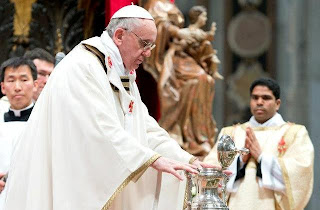THE new pope of the world’s 1.2 billion Catholics is a simple pastor,
at home with society’s underprivileged, who took the name of Francis in honor of
the medieval saint who was enamored with ‘Lady Poverty.’
The
election of Jorge Mario Cardinal Bergoglio, a pastor known for his simplicity sends
a significant message in the modern Church that is currently grappling with challenges
on all fronts—including widespread secularism and diminishing Church
attendance, allegations of sexual abuse by members of the clergy, ‘Vatileaks
scandal’, and perceived infighting among members of the Vatican Curia—among
others.
Cardinal
Bergoglio, who took the name Francis upon acceptance of the leadership of the
Catholic Church, looked stunned when he emerged at the balcony of St. Peter’s
Basilica after his election to give his blessing on the hundreds of thousands
of pilgrims gathered in the square.
Although
possibilities have been raised before the conclave that the new pope can come
anywhere else than Europe—either from the Americas, Africa or even Asia, where Catholicism
is on the rise—Bergoglio’s election to the papacy came as a surprise to many, considering
that his name was not among those floated as possible ‘papabile’. But the election outcome only shows that
indeed, it is the Holy Spirit who steers the proceedings and leads the electors
to pick the person that God has chosen to become pope to shepherd his people.
The
recent conclave was pretty swift, as the previous two conclaves that elected
John Paul II and Benedict XVI were. Bergoglio was elected only after two days, on
fifth balloting.
Reactions
Even
with the presence of social media and other forms of modern communication at
its disposal, the Vatican only released the news of the pope’s election
officially after the pope has given his urbi et orbi blessing at St. Peter’s
balcony. The tweet @Pontifex HABEMUS PAPAM FRANCISCUM was sent only two hours after
the smoke signal and after having deleted the previous tweets of Benedict XVI
in the papal twitter account.
According to Twitter, news of papal election had
reached around 7 million tweets and at some point reached a peak of 132,000
tweets per minute. The pope garnered the eight slot in Twitter’s top ten’s
worldwide trending topics an hour after the pope’s election. A good percentage
of the tweets originated from United States at 21 percent followed by Argentina
at 19 percent. The remaining percentages are divided from other countries.
But
for the hundreds of thousands of pilgrims who were at St. Peter’s Square and
millions more glued before their television sets to witness the historic moment,
nothing can beat the feeling of awe, in being a personal witness to the
unfolding of the momentous event in the life of the modern Church, a significant
occasion one would want to cherish and remember throughout life.
In
the archdiocese of Buenos Aires, hundreds of Argentineans who were gathered
outside the cathedral erupted in joy upon learning that one of their own was
elected pope.
In
downtown Vancouver, the bells of the Holy Rosary Cathedral rang out repeatedly to
celebrate the election of the new pope.
Vancouver
Archbishop John Michael Miller, in a television interview remarked that the new
pope was “very well known for being a close advocate of the poor and living an
exemplary simple life, that’s why he obviously chose the name Francis.”
In
Toronto, meanwhile, local parishioners who gathered at St. Michael’s Cathedral
to pray for the election of the new pope expressed joy in seeing their prayers answered
sooner than expected.
“I’m
very happy,” one parishioner said in a television interview, “it’s my prayer to
have a pope from somewhere else, not necessarily from Europe. And so, am very
happy that they elected a pope from Latin America.”
“It’s
fantastic. You know, there has been a talk about having a non- European pope.
To have someone who has the skill, the background that is required, to
represent the Church, not from Italy, not from Europe…” another parishioner
added.
And
yet for some, a bit of a disappointment was also apparent.
Days
before the conclave, the name of Canadian Cardinal Marc Oullet was among those floated
as one of possible ‘papabile’. The prospect of having a Canadian pope has somehow
caught the fancy of the Canadian media. The interest was evident as news
reports and commentaries analyzed the possible impact a Canadian pope would
have on a highly secularized Canadian society. At the start of the conclave on
March 12, the sleepy town of La Motte in Quebec—a small municipality of 439
people where Cardinal Oullet was born and grew up—suddenly came to life when
journalists started to arrive en masse in anticipation of having a homegrown cardinal
elected pope.
Who is Pope
Francis?
Known
for his simple and unassuming lifestyle, Bergoglio as Archbishop of the Argentine
capital city is said to be at home with the poor and rode a bus when visiting
people in his archdiocese.
The
name Francis which he took upon acceptance of his election as pope is
indicative of his preference towards a simpler lifestyle, which he was already accustomed
to even as an archbishop and as a cardinal.
Back
in Buenos Aires, instead of living in an Archbishop’s palace, Bergoglio chose
to stay in a small apartment and cooked his own meals.
The
son of Italian immigrants, Bergoglio was born in
Buenos Aires on Dec. 17, 1936. He completed his studies at the University of Buenos
Aires with a master’s degree in Chemistry, but later left behind the opportunity
of a successful career in exchange of a religious vocation among the Jesuits.
He studied liberal arts in Santiago,
Chile, and in 1960 earned a degree in philosophy from the Catholic University
of Buenos Aires.
Bergoglio taught literature and
psychology at Inmaculada high school in the province of Santa Fe between 1964
and 1965, and in 1966, taught the same courses at the prominent Colegio del
Salvador in Buenos Aires.
He was ordained a priest on Dec. 13, 1969. After his perpetual profession as a Jesuit in
1973, he was appointed Master of novices, and within the same year, was elected
superior of the Jesuit province of Argentina, a position he held for six years.
From 1980
to 1986 he was assigned as rector of the Philosophical and Theological Faculty
of San Miguel while serving at the same time as pastor of the Patriarca San
Jose parish in the Diocese of San Miguel. In March of 1986 he went to Germany
to finish his doctoral dissertation. He was sent later by his superiors to the
University of El Salvador, then to Cordoba, where he served as a confessor and
spiritual director.
In May 1992, Pope John Paul II appointed
Bergoglio auxiliary bishop of Buenos Aires. As an auxiliary bishop he
maintained a low profile, devoting most of his time looking after the Catholic
university and exercising his priestly duties—counseling priests, preaching and
hearing confessions.
On June 3, 1997, he was named coadjutor archbishop
and was installed Archbishop of Buenos Aires on Feb. 28, the following year.
He was
created and proclaimed Cardinal by Blessed John Paul II in the consistory of 21
February 2001, bearing the Title of S. Roberto Bellarmino (St. Robert
Bellarmine).
Among
other responsibilities he held, Bergoglio was Adjunct Relator General of the
10th Ordinary General Assembly of the Synod of Bishops, October 2001. He served
as President of the Bishops' Conference of Argentina from 8 November 2005 until
8 November 2011. He was a member of the Vatican Congregations for Divine
Worship and Discipline of the Sacraments; for the Clergy; and for Institutes of
Consecrated Life and Societies of Apostolic Life; and of the Pontifical Council
for the Family and the Pontifical Commission for Latin America.
Bergoglio
also served as the Ordinary for Eastern-rite faithful in Argentina who lack an
Ordinary of their own rite.
Staunch
pro-lifer
As
the leading prelate of Argentina’s estimated 33 million Catholics, Bergoglio
often had to speak his mind on issues affecting the economic-socio-political
landscape of his country.
A
staunch defender of Church teachings especially on the sanctity of life,
Bergoglio’s stand on moral and political issues often put him in collision with
the Argentine leadership.
In
2010, Bergoglio denounced the government’s move to legalize same-sex marriage—the
first Latin American country to do so, urging all the clergy in Argentina to rally
people against ratification of the law as it could "seriously injure the
family.”
Even
as Argentina proceeded to enact the law, Bergoglio continued to be critical of
his government’s anti-life mentality, calling the same-sex law as work of the
devil aimed at destroying the Church.
When
the government proposed the legalization of abortion “under certain
circumstances”, he accused the leadership of “lacking respect for the values
held by the majority of Argentines and of trying to convince the Catholic
Church ‘to waver in our defense of the dignity of the person.’”
Bergoglio
was also vocal in his opposition of same-sex couples’ adopting children, saying
doing so would deprive children of “human growth that God wanted them given by
a father and a mother."
He
urged both his clergy and the laity to strongly oppose any attempt to devalue human
life in all its stages, as in the case of contraception, abortion and
euthanasia.
Many firsts
The
new pope of the world’s 1.2 billion Catholics holds the title of many firsts. He
is the first pontiff to take the name of Francis, the first Jesuit to become
pope, the first South American, the first from the New World, the first from
the Southern Hemisphere, the first to become pope while his predecessor is
still living and the first non-European since Syrian-born Gregory III reigned as
pope from 731 to 741.
In
assuming the name of Francis, who was known to shun a lavish lifestyle in
exchange of poverty, Bergoglio is seemingly sending a strong message to the
Church and to society in general.
And
poverty is not only what the name communicates, as it also stands for love and
respect for the environment, for justice and most of all, right to life. (Pinky
Barrientos/CBCPNews)










